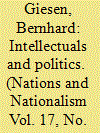| Srl | Item |
| 1 |
ID:
104108


|
|
|
|
|
| Publication |
2011.
|
| Summary/Abstract |
By imagining their audiences, intellectuals invented and constructed the collective identities of nations and transnational communities like Europe or humankind. Four ideal types of intellectuals are outlined by describing them in their relation to politics: the intellectual as cosmopolitan ascetic; the intellectual as enlightened legislator; the intellectual as revolutionary; and the intellectual as the voice of a traumatic memory. These ideal types change over time in response to their focus of attention and their mode of communication. Because of changes in their media (from handwritten to printed books) and changes in their written language (from Latin to French and Italian, and further to vernacular languages), intellectuals were able to change views on past, present and future times. Today, they are involved in (civic) resistance but rarely in politics per se. By renewing the tension of the sacred and profane - the so-called axial-age revolution - contemporary intellectuals in Eastern Europe are decoupled from direct political power.
|
|
|
|
|
|
|
|
|
|
|
|
|
|
|
|
| 2 |
ID:
151179


|
|
|
|
|
| Summary/Abstract |
In this brief essay, I explore the relationship between ‘states’ (or more broadly, institutions of political authority) and ontological security. Drawing from historical examples, I argue that it is a mistake to assume that all ‘states’ seek ontological security: this generalisation applies only to those polities that claim to be the main ontological security providers. I then develop a typology of institutional ontological security provision arrangements as have existed throughout history, arguing that another reason the concept of ontological security is valuable for international relations (IR) is because it offers a way to compare systems across time and space without assuming the primacy of politics or religion. In summary, IR does not have to limit its use of the concept of ontological security to a synonym for ‘state identity’ – ontological security can offer much more than that by helping the discipline reach across time and space.
|
|
|
|
|
|
|
|
|
|
|
|
|
|
|
|
| 3 |
ID:
186352


|
|
|
|
|
| Summary/Abstract |
The debate on the epistemological significance of leadership versus domestic politics or strategic culture remains fervent in modern International Relations. We suggest that there is a consensus found in classical Greek and Chinese texts about the core elements of realism and the consequentiality of political leadership on strategic choice. By engaging in a comparative study of strategic concepts emanating from pre-Qin China and Classical Greek strategic texts (which were developed independently into two closed hegemonic systems), we argue that the strategic logics of the West and East attest to the existence of a universal canon of strategy, one that places a premium on political leadership. Moreover, a shared intercultural strategic doctrine acknowledges the importance of utilitarian morality in politics, a consequentiality embedded within the structural restrictions of the interstate system and the constancy of human nature.
|
|
|
|
|
|
|
|
|
|
|
|
|
|
|
|